Overview
Nursing care at home provides essential health services directly in a patient’s residence, catering to individuals recovering from illness or managing chronic conditions. This approach enhances their recovery experience in a familiar environment, which is so important during challenging times.
This type of care not only addresses medical needs through skilled nursing and rehabilitation but also nurtures emotional well-being. Families seeking quality assistance for their loved ones will find this option to be vital. In addition, the comforting presence of caregivers can make a significant difference in the healing process, allowing patients to feel secure and supported in their own homes.
We understand that navigating health challenges can be overwhelming. That’s why we’re here for you, offering compassionate care tailored to individual needs. Your comfort is our priority, and we strive to create a supportive atmosphere that fosters recovery and peace of mind.
If you’re considering home nursing care for yourself or a loved one, reach out to us today. Together, we can ensure that you or your family member receives the attentive care needed to thrive.
Introduction
In the realm of healthcare, home nursing care has emerged as a vital alternative for individuals seeking personalized and compassionate support within the comfort of their own homes. As our loved ones age and chronic conditions become more prevalent, the demand for home health services is skyrocketing. This article delves into the multifaceted world of home nursing care, exploring the diverse services available, the essential roles played by nurses and caregivers, and the challenges families face in this complex landscape.
By understanding these elements, families can make informed decisions that prioritize their loved ones’ well-being. It’s crucial to ensure they receive the highest quality of care tailored to their unique needs. Discover how home nursing care not only enhances recovery outcomes but also fosters emotional connections, making it an invaluable option for many. Your comfort is our priority, and we’re here for you as you navigate this important journey.
What is Home Nursing Care?
Nursing care for home encompasses a wide range of health services provided directly in a patient’s residence, catering to individuals recovering from illness, managing chronic conditions, or needing assistance due to age-related challenges. This approach emphasizes individualized attention, allowing people to receive nursing care in a familiar and comfortable setting, which can significantly enhance their recovery experience.
At Best Care Nurses Registry, our Private Duty RNs and LPNs deliver vital patient assistance, informing individuals about various health issues while offering guidance and emotional support. This adaptable support not only addresses medical needs but also fosters companionship, ensuring that patients feel valued and understood. Home health support is more affordable, more accessible, and equally effective as the assistance provided in a hospital or nursing facility.
The spectrum of nursing care for home includes skilled nursing options, rehabilitation therapies, and assistance with daily activities. Proficient nursing care may involve administering medications, treating wounds, and monitoring vital signs, while rehabilitation options, such as physical therapy, focus on regaining mobility and independence. Personal support assistance, offered by our dedicated CNAs and HAs, addresses daily living needs, including bathing, dressing, and meal preparation, ensuring that patients maintain their dignity and quality of life.
Our CNAs and HHAs are available for hourly assistance, with no minimum required, simplifying the process for families to identify the appropriate level of support.
As the need for nursing support continues to grow, driven by an aging demographic and rising chronic health concerns, the industry faces considerable challenges. A projected need for 924,000 personal support aides and residential health aides is anticipated between 2021 and 2031, highlighting the urgent necessity for support agencies to expand their workforce and enhance their offerings. In 2020 alone, approximately 3.0 million patients received assistance from health agencies, underscoring the essential role these services play in the healthcare continuum.
Furthermore, as reported by U.S. News & World Report, over 1.4 million individuals reside in Medicare- and Medicaid-certified nursing facilities across the country, emphasizing the need for alternative support options.
Recent advancements in residential nursing services demonstrate an increasing acknowledgment of its benefits. Studies indicate that patients receiving nursing care for home often experience better recovery outcomes, fewer hospital readmissions, and heightened overall satisfaction. This trend is supported by case studies showing that as the elderly population grows, nursing care for home becomes increasingly vital.
Nevertheless, many organizations struggle to accept new patients due to workforce shortages, highlighting the need for innovative solutions to improve service provision and patient accessibility.
Expert insights consistently affirm the benefits of nursing care for home support. Healthcare professionals observe that this type of care not only promotes emotional well-being but also encourages greater patient involvement in their own health management. This comprehensive approach to support addresses medical needs while enhancing the emotional and social dimensions of recovery, making nursing care for home an invaluable choice for seniors and their families.
For additional information or to arrange assistance, please call (888) 203-2529.
Types of Home Nursing Services Available
The options for nursing care at home include a range of vital support choices designed to meet the diverse needs of patients. These services can be categorized as follows:
- Skilled Nursing Services: Provided by registered nurses (RNs) or licensed practical nurses (LPNs), skilled nursing services encompass critical medical assessments, medication administration, wound treatment, and ongoing monitoring of health conditions. This type of nursing care is essential for patients with intricate medical requirements, ensuring they receive appropriate interventions in the comfort of their homes. It’s important to note that 14.1% of home health episodes lead to hospital admissions or emergency room visits, underscoring the crucial role of nursing care in preventing such outcomes.
- Personal Care Assistance: These aides focus on helping individuals with daily living activities, such as bathing, dressing, grooming, and meal preparation. Personal attention is especially beneficial for seniors and individuals with chronic illnesses, assisting them in preserving their dignity and autonomy. Best Care Nurses Registry highlights customized respite support options, ensuring that each plan is tailored to the unique needs of the individual.
- Physical Therapy: Focused on rehabilitation, physical therapy services help patients enhance mobility and strength, particularly following surgery or injury. This type of care is vital for recovery, enabling individuals to regain their physical capabilities and improve their quality of life.
- Occupational Therapy: This program assists individuals in regaining the skills necessary for daily living and working. Occupational therapists collaborate with patients to develop personalized strategies that promote independence in everyday tasks.
- Speech Therapy: Addressing communication and swallowing difficulties, speech therapy provides essential support for patients recovering from strokes or other conditions affecting their speech and swallowing abilities.
- Companionship Assistance: Non-medical support that offers social interaction and emotional encouragement, companionship assistance plays a significant role in reducing feelings of isolation among seniors. This form of support fosters mental well-being and enhances overall quality of life. The emotional support provided by caregivers is vital, especially for families concerned about the safety and welfare of their loved ones.
As the demand for nursing care at home continues to rise, the expanding senior population requires improved access to these resources. However, many agencies face critical staffing shortages, which can hinder their ability to accept new patients. This situation emphasizes the need for enhanced staffing solutions and resources to meet the growing demand for health assistance offerings.
Additionally, family caregivers often experience significant stress, which can shorten their lives by up to 10 years, highlighting the necessity of professional assistance in nursing. Furthermore, it is significant that 96% of caregivers of veterans are women, with 70% providing support to their spouse or partner, illustrating the demographic profile of caregivers and its impact on in-home nursing.
Nursing care at home is not only more convenient and effective but also cost-efficient compared to treatment in a hospital or nursing facility. By understanding the different types of nursing services available, families can make informed choices that best fit their loved ones’ needs, ensuring they receive the highest quality of care in a comfortable setting.
You don’t have to do it alone. We’re here for you. Call Best Care Nurses Registry at (888) 203-2529 to schedule a call and discuss your needs today.
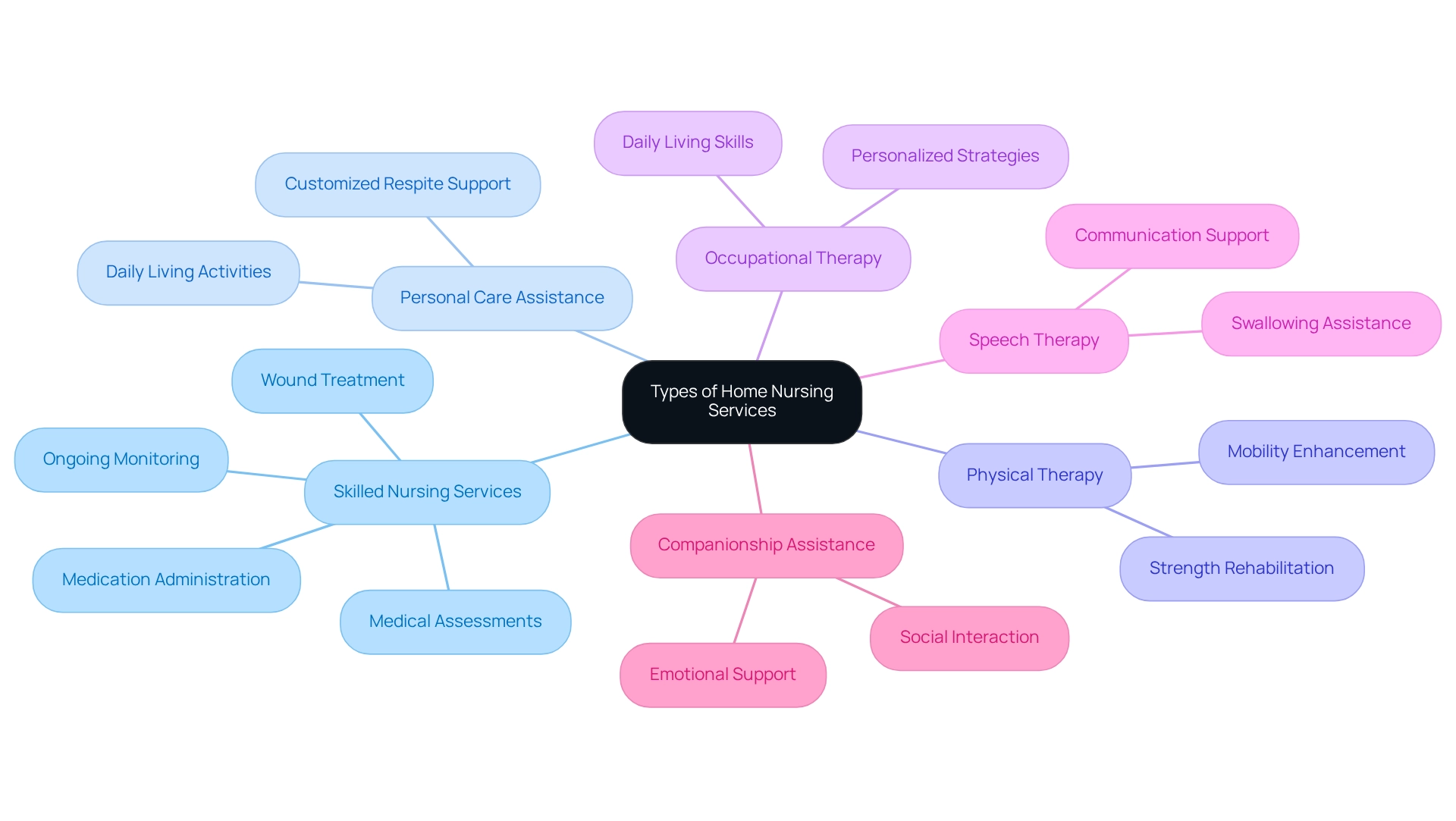
Roles of Nurses and Caregivers in Home Care
In home assistance, the roles of nurses and aides at Best Care Nurses Registry are distinct yet interdependent, each contributing to the overall well-being of patients:
- Registered Nurses (RNs): RNs are essential in crafting and managing personalized support plans. They administer medications, conduct comprehensive assessments, and provide vital education to both patients and their families. Their expertise ensures that nursing care at home is tailored to meet the specific needs of each individual, especially those facing complex health challenges.
- Licensed Practical Nurses (LPNs): Working under the guidance of RNs, LPNs provide crucial support by monitoring vital signs, administering medications, and performing fundamental nursing tasks. Their role is vital in maintaining continuity of care and ensuring that patients receive timely interventions.
- Home Health Aides (HHAs): HHAs focus on delivering personal assistance, helping with daily living tasks, and providing companionship. They are trained to recognize changes in a patient’s condition and promptly communicate these observations to the nursing team, significantly aiding in the early detection of potential health issues.
- Support Providers: Often non-medical individuals, support providers offer essential help with personal tasks and household duties while also providing emotional support. Their presence is invaluable in ensuring the patient’s comfort and safety, creating a nurturing environment that promotes independence and enhances quality of life.
At Best Care Nurses Registry, the integration of these roles is particularly significant, especially considering that one in four adults over the age of 65 experiences a fall each year. This statistic highlights the necessity for vigilant in-home support. Additionally, the financial aspect of residential health support is considerable, with an hourly average wage of $19.76 and an annual average wage of $41,090 for personal support aides and health aides, underscoring the importance of these vital roles.
Sherie Garzon, as the primary matchmaker at Best Care Nurses Registry, embodies our commitment to individualized assistance. With her extensive experience since 1991, she expertly connects clients with providers who best meet their needs, ensuring that emotional support and tailored solutions are prioritized in our services. This collaborative effort among RNs, LPNs, HHAs, and caregivers creates a comprehensive support network that addresses both medical and emotional needs, ultimately enriching the nursing care experience for home patients in residential settings.
As the demand for residential health services continues to rise, with a projected need for 924,000 personal support aides and health aides between 2021 and 2031, understanding these roles is crucial for families seeking reliable assistance for their loved ones. Furthermore, recognizing the dynamics of caregiving relationships is essential in delivering effective support. Best Care Nurses Registry offers flexible service options, with no minimums and 24-hour assistance availability, ensuring that families receive the personalized support they truly need.
Challenges Families Face in Home Care
Families often encounter numerous challenges when providing support at home, which can significantly impact their well-being and the quality of care they offer. These challenges can feel overwhelming, but understanding them is the first step toward finding effective solutions.
Emotional Stress is a major hurdle. The responsibilities of caregiving can lead to increased anxiety, guilt, and burnout. Research reveals that unpaid caregivers are 3.33 times more likely to report substance use as a coping mechanism compared to prior months. Richard Schulz, a professor of psychiatry, emphasizes, “The intensity of caregiving, whether measured by the type or quantity of assistance provided, is associated with the magnitude of health effects.” This highlights the profound emotional toll caregiving can take on one’s health.
Time Management poses another significant challenge. Balancing caregiving duties with personal and professional commitments can feel overwhelming. Many caregivers struggle to carve out time for their own needs while ensuring their loved ones receive the attention they deserve. Fortunately, community organizations offer skills training and support groups to help caregivers manage their time more effectively.
Financial Strain is also a reality for many families. The costs associated with home support services can accumulate rapidly, especially when insurance coverage falls short. Families often face tough decisions regarding resource allocation, leading to financial stress and uncertainty about long-term support options. The Best Care Concierge Program assists families by connecting them with financial advisors who can help navigate these challenges, ensuring they are well-informed about long-term insurance options. Best Care accepts most Long Term Care insurances directly, simplifying the payment process and alleviating some financial burdens. Families may need to complete an Assignment of Benefits (AOB) form, allowing Best Care to receive payment directly from the insurance carrier.
Communication Barriers can complicate the caregiving experience. Effective interaction with healthcare professionals and caregivers is crucial for addressing support needs. However, miscommunication often arises, hindering support strategies and leading to inadequate assistance for loved ones. Community groups can enhance communication methods and service coordination, ensuring that families receive the help they need.
Safety Concerns are paramount, especially for individuals with mobility issues or cognitive impairments. Families must navigate various safety challenges, from preventing falls to managing medications, which can be daunting without proper guidance. Community organizations can provide valuable resources and training to address these safety concerns.
To effectively tackle these challenges, families can follow three simple steps to ensure compassionate home assistance with Best Care Nurses Registry:
- Call to speak with our friendly staff to discuss your needs and answer any questions.
- Discuss your situation with a care plan from a doctor tailored to your individual requirements.
- Choose from compassionate caregivers who are ready to collaborate with your family.
Best Care also offers flexible caregiver replacement options, ensuring that your loved ones receive the support they need when circumstances change.
The emotional and financial impacts of caregiving are profound, as highlighted by case studies that stress the importance of caregiver support and interventions. Incorporating caregivers into health planning is essential, as their well-being directly influences the quality of care provided to older adults. By addressing these challenges through community support and the resources available from Best Care Nurses Registry, families can navigate the complexities of at-home care, ensuring their loved ones receive the compassionate assistance they deserve.
Choosing the Right Home Care Provider
When choosing a domestic assistance provider, families should thoughtfully assess several essential factors to ensure they select the optimal choice for their loved ones.
- Licensing and Accreditation: It is vital to confirm that the agency holds the necessary licenses and accreditations from relevant health authorities. This not only ensures compliance with state regulations but also reflects the agency’s commitment to maintaining high standards of care.
- Services Provided: Families should verify that the agency offers the specific assistance needed by their loved one, whether it be personal support, companionship, or skilled nursing. A comprehensive range of nursing care can significantly enhance the quality of support received at home. For instance, Best Care Nurses Registry provides a concierge program for 24/7 nurse access and ensures suitable caregiver matches, which are essential for individualized support. The nurses recommended by Best Care not only deliver essential patient assistance but also inform patients about various health conditions, providing emotional support that is crucial for overall well-being.
- Staff Qualifications: Inquire about the qualifications, training, and experience of the caregivers and nurses. Agencies that prioritize recruiting well-trained personnel demonstrate a commitment to providing safe and effective services. For example, the median annual wage for residential health aides was reported at $48,060 in May 2023, highlighting the professional nature of this field and the importance of hiring qualified caregivers.
- Reputation: Investigating feedback and endorsements from other households can offer important perspectives on the agency’s dependability and quality of service. A strong reputation often correlates with positive experiences and outcomes for clients. Best Care’s dedication to individualized service and adaptability has established it as a frontrunner in the home health sector, attracting families looking for outstanding assistance for their loved ones. Direct quotes from satisfied clients can further enhance credibility and social proof.
- Support Plan Customization: Ensure that the agency is willing to create a personalized support plan tailored to the unique needs of your loved one. This flexibility is crucial for addressing specific health conditions, including dementia, and for enhancing the overall quality of life. Best Care Nurses Registry emphasizes the importance of creating individualized nursing care plans that address the specific needs of each patient, ensuring they receive the most effective support possible.
- Communication: Select a provider that prioritizes open dialogue and is attentive to the concerns of relatives. Effective communication builds trust and guarantees that family members are kept informed about their loved one’s care.
- Pricing: Understanding the pricing framework is crucial for families to evaluate the cost-efficiency of Best Care’s services in relation to conventional treatment facilities. Best Care Nurses Registry offers competitive pricing options that can provide significant savings while ensuring high-quality care.
- Pet-Friendly Services: For families with pets, it is essential to determine if the agency includes pets in their support plans. Best Care Nurses Registry is pet-friendly, allowing families to keep their cherished pets’ presence while receiving care.
Additionally, families should be aware of the significance of understanding hospice charges, as outlined by the Home Care & Hospice Financial Managers Association (HFMA). By taking these factors into account, families can make informed choices when selecting a support provider, ultimately resulting in improved outcomes and peace of mind.
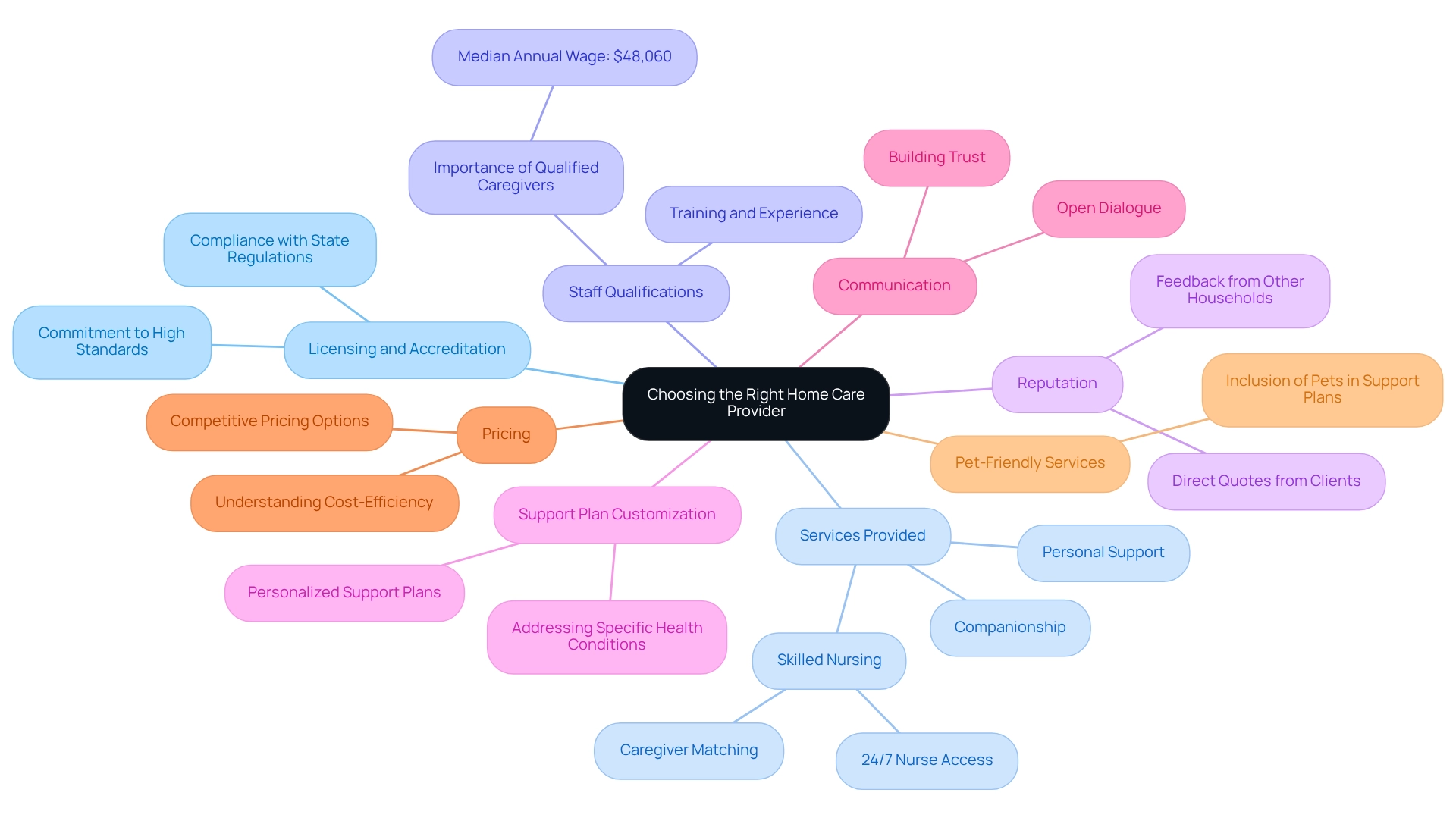
Creating Personalized Care Plans
Developing a customized support plan is essential for ensuring effective nursing care at home, particularly for individuals with unique needs, such as those living with dementia or long-term conditions. This process involves several critical steps:
- Assessment: Start with a thorough evaluation of the individual’s medical history, current health status, and personal preferences. This foundational step is vital for understanding the specific needs of the patient.
- Goal Setting: Collaborate closely with the patient and their family to establish clear, attainable objectives for treatment. This cooperative approach fosters a sense of ownership and commitment to the care plan.
- Service Coordination: Identify the necessary assistance to achieve the established goals. This may involve a combination of medical, therapeutic, and personal support services tailored to the individual’s needs.
- Regular Review: Schedule consistent evaluations of the support plan to monitor progress and make adjustments as needed. This flexibility is crucial, as health conditions and personal circumstances can evolve over time.
- Engagement of Support Team: Ensure that all members of the support team, including family members and healthcare professionals, are actively involved in both the planning and implementation processes. This collaborative effort enhances communication and ensures everyone is aligned with the treatment objectives.
The significance of personalized support plans cannot be overstated. Research shows that tailored treatment approaches lead to improved health outcomes and greater patient satisfaction. For example, a study on self-management support for patients with end-stage renal disease revealed that structured, face-to-face assistance from clinical nurse specialists significantly enhanced patients’ self-management skills, with no reported drop-outs. This underscores the effectiveness of individualized support in fostering self-management abilities.
Furthermore, as noted by U.S. News & World Report, over 1.4 million individuals reside in Medicare- and Medicaid-certified nursing facilities across the country, highlighting the increasing demand for home health services and the importance of personalized support plans. Healthcare professionals emphasize that customized treatment plans, especially for home nursing care, not only address medical needs but also consider emotional and social factors, which are crucial for holistic well-being.
Additionally, Best Nurses Registry is committed to maximizing long-term support insurance benefits and offers various payment options, including Assignment of benefits from long-term support insurance firms, VA Aide and Attendance Pension, private pay, and assistance from long-term support insurance companies. This positions Best Care Nurses Registry as a leader in providing personalized support solutions. By prioritizing individualized assistance, families can ensure their loved ones receive the most appropriate and impactful support, ultimately enhancing their quality of life.
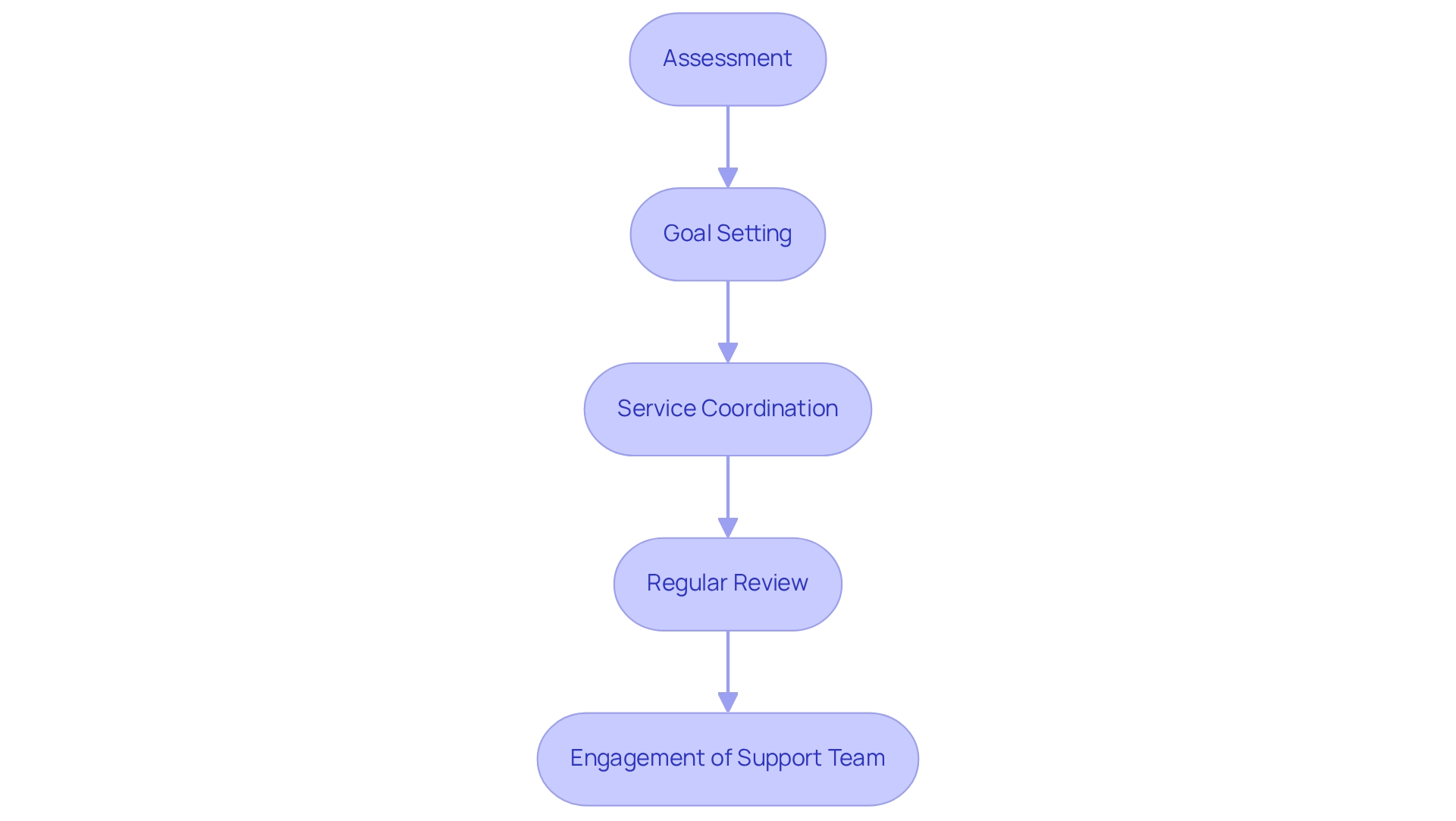
Tips for Managing Home Care Effectively
To manage home assistance effectively, families can implement several nurturing strategies:
- Establish a Routine: Creating a structured daily schedule that includes designated times for meals, medications, and activities can significantly enhance the quality of support. This routine not only provides stability for the patient but also helps caregivers manage their time more efficiently. Without such routines, seniors may face health declines, poor nutrition, and hygiene issues, underscoring the importance of consistent care.
- Communicate Openly: Maintaining clear and consistent communication with caregivers and healthcare providers is essential. Frequent updates and conversations regarding the patient’s condition and treatment strategy ensure that everyone involved is aligned and can respond swiftly to any changes. This communication is vital to prevent medication mismanagement and to address any emerging health concerns.
- Utilize Technology: Leveraging technology can streamline home management. Applications created for medication reminders, scheduling, and monitoring health metrics can assist caregivers in remaining organized and guarantee that patients receive prompt attention. This integration of technology can also alleviate some of the burdens on caregivers, allowing them to focus on providing compassionate support, which is crucial for preventing social isolation and enhancing emotional well-being.
- Seek Support: It’s important for caregivers to recognize when they need assistance. Involving family members, friends, or professional services can offer essential support and ensure that the patient continues to receive high-quality assistance. Community organizations often offer resources such as skills training and support groups, which can further enhance caregiver capabilities and reduce strain. For instance, many community organizations provide interventions aimed at relieving caregiver strain, which can be invaluable for families.
- Prioritize Self-Care: Caregivers must prioritize their own well-being to avoid burnout. Participating in self-care activities not only aids the caregiver but also enhances the quality of assistance given. Research indicates that caregivers who take time for themselves report lower levels of stress and better overall health, which can lead to improved outcomes for their loved ones. Significantly, relatives with high caregiver burden participate less frequently in self-care activities compared to the general population, emphasizing the significance of self-care for caregivers.
Incorporating these practices can result in a more efficient domestic support experience, ultimately improving the quality of life for both caregivers and patients. As noted in a study, 80% of caregivers report feeling a sense of purpose from their roles, reinforcing the dual benefits of caregiving when combined with self-care strategies. By creating routines and using available resources, households can manage the intricacies of domestic support with increased assurance and achievement.
Best Care Nurses Registry, with its solid reputation in South Florida since 1980, is here to assist households in implementing these strategies effectively, ensuring that seniors receive the personalized assistance they require to maintain their independence and dignity.
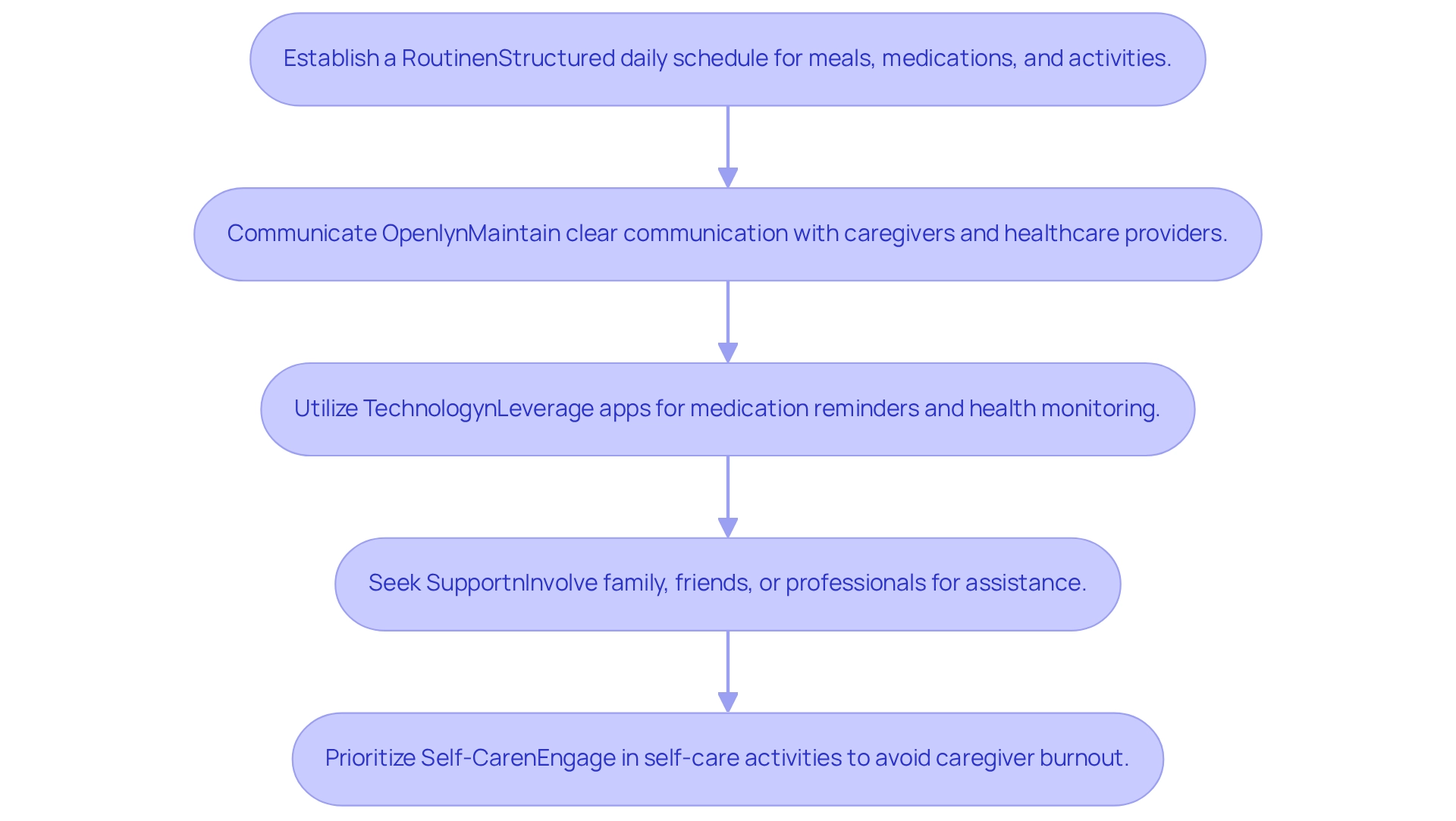
Understanding Costs and Insurance for Home Care
Understanding the costs associated with nursing care for home assistance is vital for families facing the challenges of caregiving. Let’s explore some key points to consider:
- Types of Costs: Home support expenses can vary significantly based on the level of assistance required and the duration of care. For instance, nursing care generally incurs higher costs compared to companionship or personal care options. Families should evaluate their unique needs to accurately estimate potential expenses.
- Insurance Coverage: Many insurance plans, including Long Term Care insurance, may cover certain aspects of home health assistance. At Best Care Nurses Registry, we accept most Long Term Care insurances directly on your behalf. This means you can direct the carrier to pay us directly through an Assignment of Benefits (AOB). However, it’s important to note that coverage can differ widely depending on individual plans and state regulations. Therefore, it’s crucial for families to consult with their insurance providers to clarify what nursing care services are included and any limitations that may apply. For example, Medicare does not cover assistance with daily living activities, such as bathing and meal preparation, which are essential for many seniors.
- Out-of-Pocket Expenses: Families should be prepared for possible out-of-pocket costs, especially for non-medical services or when insurance coverage is limited. Studies show that nearly one-third of Americans have cared for an elderly, ill, or disabled relative, highlighting the financial burden many families face. Additionally, those with medical debt often experience financial distress, complicating caregiving responsibilities. By understanding the costs of nursing care upfront, families can plan and budget more effectively.
- Financial Assistance Programs: There are numerous financial assistance programs available that can help alleviate the costs of home support. State-funded programs and non-profit organizations frequently provide resources to assist families in need. Exploring these options can significantly ease the financial strain associated with caregiving, and we encourage families to actively seek out these resources to maximize their support.
- Case Studies on Home Care Costs: For instance, a recent study revealed that one in four adults over the age of 65 experiences a fall each year, underscoring the importance of in-home caregivers to help mitigate such risks. This not only highlights the value of investing in home support but also illustrates potential long-term savings by avoiding costly hospitalizations due to falls. Furthermore, 78 percent of patients indicated they would recommend their health agency to friends and family, reinforcing the significance of quality at-home services.
By comprehending these aspects of in-home expenses, including the role of Long Term Care insurance and the implications of the elimination period, families can make informed decisions that ensure their loved ones receive the necessary support while managing their financial obligations.
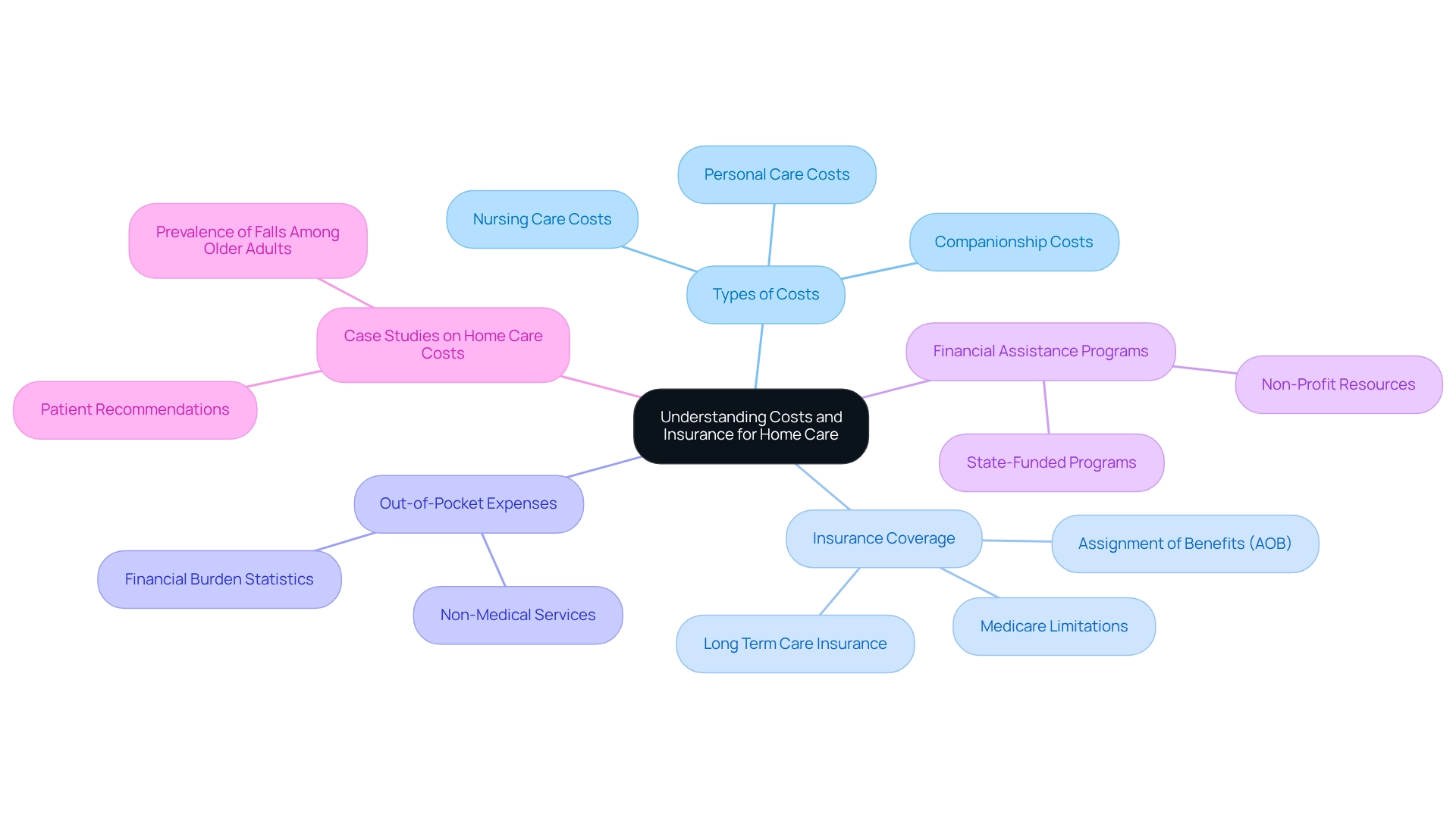
The Importance of Communication in Home Care
Effective communication is crucial in home support for several key reasons.
- Building Trust: Creating open channels of communication nurtures trust between caregivers and families, which is essential for providing effective support. Trust improves the caregiver-family connection, enabling a more tailored approach to assistance. As Steve Alder observes, effective communication enhances the quality of service and patient outcomes, improving the overall patient experience.
- Clarifying Needs: Regular discussions regarding the patient’s needs, preferences, and any changes in their condition ensure that care remains aligned with their goals. This proactive communication aids in customizing offerings to fulfill individual needs, especially for those with dementia, where requirements may change quickly. Families often face emotional challenges while caring for loved ones with dementia, making clear communication even more vital. Observing signs of social isolation, such as loneliness, difficulty with daily tasks like cooking and cleaning, or safety concerns like frequent falls can indicate a need for companion or sitter services, which can enhance the loved one’s independence and quality of life.
- Feedback Mechanism: Communication acts as a crucial feedback loop, allowing relatives to share their observations and concerns regarding the support being provided. This feedback permits prompt modifications, ensuring that the treatment plan stays effective and responsive to the patient’s evolving circumstances. Discussing the potential advantages of companion services can also be part of this feedback process, assisting households in recognizing when extra support may be required.
- Coordination of Treatment: Keeping all parties informed—including healthcare providers, caregivers, and relatives—ensures a unified approach to managing the patient’s health. This is particularly important in complex cases, where multiple healthcare professionals may be involved. For example, adopting organized communication methods, like HIPAA-compliant text messaging, can greatly enhance the precision and dependability of information shared during transitions, thus improving continuity of support, particularly for dementia patients.
In 2025, the focus on communication in home support is stronger than ever, with regulatory bodies promoting policies that foster effective communication as part of quality enhancement efforts. These policies directly affect households and caregivers, ensuring that they have the essential tools and support for effective communication. Statistics show that over 16 million individuals in the U.S. support someone with dementia, emphasizing the necessity for clear and consistent communication to manage the challenges of caregiving.
By prioritizing effective communication and recognizing the signs that indicate a need for companion services, relatives can ensure that their loved ones receive the highest quality of assistance from Best Care Nurses Registry, ultimately leading to improved patient outcomes and satisfaction.
Taking Action: Next Steps for Families
To effectively secure home assistance for a loved one, families should follow these essential steps:
-
Assess Needs: Begin by evaluating the specific support requirements of your loved one. Understanding their medical conditions, daily living activities, and any specialized care they may need—such as assistance with dementia-related challenges—is crucial. Indicators suggesting the need for CNA/HHA caregiver assistance include difficulty with personal hygiene, dressing, cooking, cleaning, or managing medications. It’s important to acknowledge that the worth of family caregivers’ contributions is estimated at $306 billion each year, emphasizing the economic importance of caregiving and the necessity of professional assistance.
-
Research Providers: Conduct thorough research on local assistance agencies. Compare their services, costs, and client reviews to identify providers that align with your loved one’s needs. This step is essential, as almost one-third of Americans have offered assistance for an elderly, ill, or disabled relative, highlighting the extensive need for nursing care for home support services.
-
Schedule Consultations: Arrange meetings with potential providers to discuss treatment options. During these discussions, families should ask about the staff’s qualifications, the agency’s method of support, and how they evaluate and adjust to evolving requirements. Participating in these discussions can greatly improve the quality of the support offered. Sustaining open dialogue with the caregiver and the home support agency ensures that any issues are resolved swiftly.
-
Create a Support Plan: Collaborate with the selected provider to develop a personalized support plan. This plan should meet the individual’s unique needs and preferences, ensuring that support is customized specifically for them. A well-organized support plan is essential for preserving quality of life and autonomy. Frequent updates from the caregiver and unscheduled visits can assist families in witnessing the assistance given and ensuring it meets expectations.
-
Stay Involved: Maintain regular communication with caregivers and healthcare providers. This ongoing dialogue is crucial to ensure that support remains aligned with the individual’s evolving needs. Families who are actively engaged in the support process often report feeling more assured and better prepared to manage challenging situations. In fact, 66 percent of caregivers who help more often with self-care tasks reported feeling ‘very much’ better able to deal with difficult situations. By following these steps, families can navigate the complexities of securing nursing care for home, ensuring that their loved ones receive the compassionate and professional support they deserve.
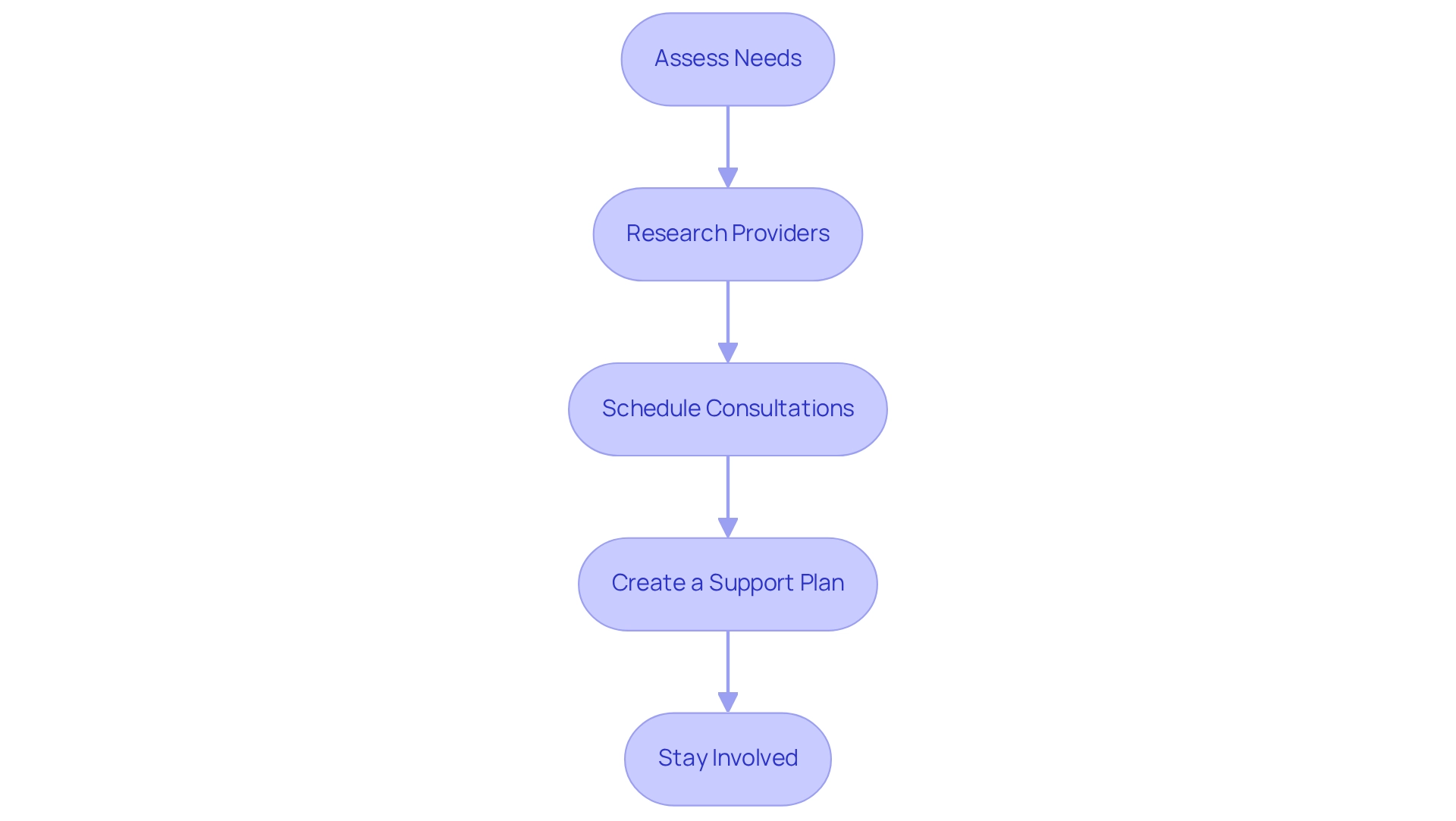
Conclusion
Home nursing care serves as a vital solution for families yearning for personalized and compassionate support for their loved ones, all within the comforting embrace of home. With a diverse range of services—including skilled nursing, rehabilitation therapies, and companionship—individuals receive comprehensive care tailored to their unique needs. As the demand for home health services continues to rise, driven by an aging population and chronic health issues, it becomes essential for families to understand the crucial roles played by nurses and caregivers in navigating this complex landscape.
Families often encounter significant challenges, such as emotional stress, time management, and financial strain, when providing home care. By acknowledging these obstacles and leveraging available resources, families can enrich their caregiving experience, ensuring their loved ones receive the highest quality of care. Effective communication with caregivers and healthcare providers is fundamental for building trust, clarifying needs, and coordinating care, ultimately leading to improved outcomes for patients.
Choosing the right home care provider is of utmost importance. Families should thoughtfully consider factors such as licensing, services offered, staff qualifications, and the ability to customize care plans. By prioritizing these elements, families can make informed decisions that resonate with their loved ones’ needs and preferences.
In summary, home nursing care not only enhances recovery outcomes but also nurtures emotional connections, making it an invaluable choice for many families. By taking proactive steps and engaging with qualified providers, families can confidently navigate the complexities of home care, ensuring their loved ones receive compassionate support while preserving dignity and independence.
Frequently Asked Questions
What is nursing care for home?
Nursing care for home encompasses a wide range of health services provided directly in a patient’s residence, catering to individuals recovering from illness, managing chronic conditions, or needing assistance due to age-related challenges.
What types of services are included in nursing care for home?
Nursing care for home includes skilled nursing services, personal care assistance, physical therapy, occupational therapy, speech therapy, and companionship assistance.
Who provides skilled nursing services?
Skilled nursing services are provided by registered nurses (RNs) or licensed practical nurses (LPNs) and include critical medical assessments, medication administration, wound treatment, and ongoing monitoring of health conditions.
What is personal care assistance?
Personal care assistance involves aides helping individuals with daily living activities such as bathing, dressing, grooming, and meal preparation, particularly beneficial for seniors and individuals with chronic illnesses.
How does physical therapy aid recovery?
Physical therapy focuses on rehabilitation, helping patients enhance mobility and strength, particularly following surgery or injury, which is vital for regaining physical capabilities.
What role does companionship assistance play?
Companionship assistance provides non-medical support that offers social interaction and emotional encouragement, significantly reducing feelings of isolation among seniors and enhancing their overall quality of life.
What are the roles of nurses and aides in home care?
Registered Nurses (RNs) manage personalized support plans, Licensed Practical Nurses (LPNs) provide essential nursing tasks, Home Health Aides (HHAs) assist with daily living tasks, and support providers offer help with personal tasks and emotional support.
Why is nursing care at home considered more convenient and cost-effective?
Nursing care at home is more convenient as it allows patients to receive care in a familiar environment, and it is generally more cost-effective compared to treatment in a hospital or nursing facility.
What challenges does the nursing care industry currently face?
The industry faces challenges such as staffing shortages, which can hinder the ability of agencies to accept new patients, despite the growing demand for nursing support driven by an aging population and rising chronic health concerns.
How can families arrange for nursing care at home?
Families can arrange for nursing care at home by contacting Best Care Nurses Registry at (888) 203-2529 to discuss their needs and schedule assistance.











